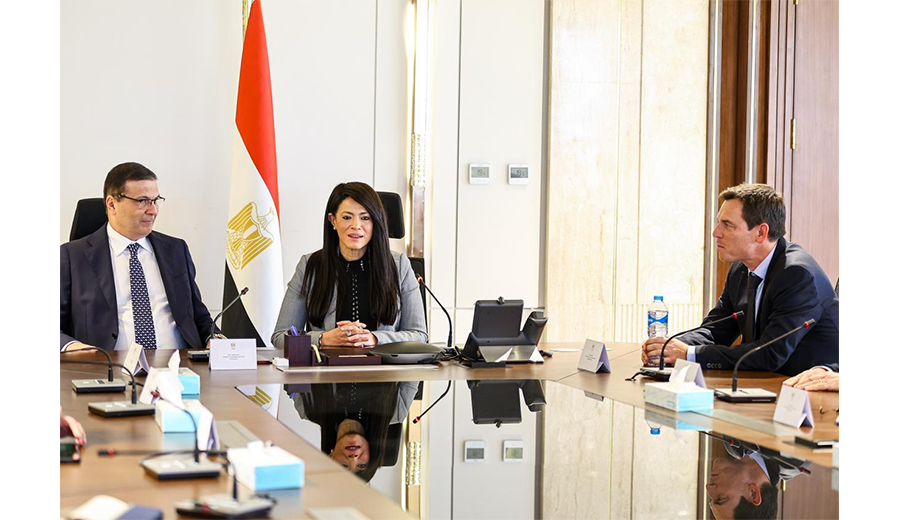H.E. Dr. Rania A. Al-Mashat: We continue to enhance the private sector’s contribution to economic activity through the governance of public spending.
03 October 2024
During Press conference Held at the Ministry’s Headquarters in the New Administrative Capital:
H.E. Dr. Rania A. Al-Mashat: We continue to enhance the private sector’s contribution to economic activity through the governance of public spending.
We have initiated procedures to activate the governance of public spending in coordination with all ministries and national entities, with priority given to projects that have exceeded 70% completion.
We are developing a financial equation that promotes economic and social equality and ensures the just distribution of public spending across governorates.
The Integrated National Financing Strategy strengthens the mobilization of both local and foreign funding to close development gaps.
H.E.
Dr. Rania A. Al-Mashat, Minister of Planning, Economic Development, and
International Cooperation, reviewed the ministry’s efforts in the governance of
public spending and the Integrated National Financing Strategy for development
during the first press conference held by the ministry following the merging of
the Ministry of Planning, Economic Development, and International Cooperation.
H.E.
Minister Al-Mashat highlighted the structure of public spending in the Economic
and Social Development Plan for the fiscal year 2024/2025, noting that it
includes projects and investments in human and social development amounting to
42%, industrial development and infrastructure projects amounting to 37%, and
local development projects and investments amounting to 21%.
H.E.
Dr. Al-Mashat also pointed out the growth of investments in the human and
social development sector over the past decade, which increased from EGP 29.3
billion in the fiscal year 2015/2016 to EGP 161.9 billion in 2024/2025.
Additionally, investments directed to the governorates have grown by 315% over
the past 10 years, rising from EGP 6.8 billion in 2014/2015 to EGP 28 billion in
2024/2025.
Governance
of Public Spending
Regarding
the governance of public spending and the monitoring and evaluation systems,
H.E. Minister Al-Mashat explained that the governance framework is based on
three key pillars: Planning investments, where project evaluation criteria have
been updated, entities are required to submit feasibility studies, investment
calculation methodologies have been developed, geographic information
integration has been enhanced, and local development programs are activated using
modern planning tools; Allocating investments, through the development of a
financial equation to address developmental gaps between governorates and
linking investments to incentives, while ensuring the integration of investment
and current expenditure; and Monitoring investment implementation, through the
automation of both desk and field monitoring processes and the inventory of
investment assets.
H.E.
Minister Al-Mashat highlighted that the Ministry of Planning, Economic
Development, and International Cooperation has implemented the financial
equation for preparing the public spending plan proposals for the governorates
starting from the fiscal year 2021/2022. The importance of this financial
equation lies in ensuring the just distribution of government investments
across Egypt’s governorates, promoting economic and social equality between
different regions, and advancing sustainable development nationwide. This
distribution relies on a set of criteria, including poverty indicators, human
development index at the governorate level, population size, and average
previous investments. A similar financial equation was adopted for distributing
investments among centers and districts within each governorate starting from
the fiscal year 2023/2024, relying on the population indicator alone for
investment distribution.
Regarding
the governance of public spending and the reordering of priorities for the
2024/2025 plan, H.E. Dr. Al-Mashat mentioned that the Ministry has coordinated
with relevant ministries and entities to establish executive steps for
investment spending governance. This is in light of the Prime Minister’s
directives to prioritize projects that have exceeded 70% completion and those
expected to be finalized, with a firm stance against approving any additional
funds for entities under the 2024/2025 plan. Coordination is also underway with
all ministries and governorates to identify any financial arrears, and work on
new projects has been postponed, with no new protocols or contracts being
signed unless coordinated with the Ministry.
The
Integrated National Financing Strategy
H.E.
Dr. Al-Mashat also highlighted the Integrated National Financing Strategy for
financing sustainable development, which was launched by the Ministry during
the Summit of the Future held within the framework of the 79th session of the
United Nations General Assembly in New York in September 2024. H.E. explained
that the strategy was developed in alignment with key national strategies and
policies, the National Structural Reform Program, the State Ownership Policy,
and the Sustainable Sovereign Financing Framework. It also aligns with the
Economic and Social Development Plan and the reform program supported by the
International Monetary Fund.
The
Integrated National Financing Strategy will support Egypt’s government efforts
to achieve the Sustainable Development Goals (SDGs). Its mechanisms and
procedures for collaboration, decision-making, and engaging relevant
stakeholders in Egypt will help close the financing gap and mitigate future
financial risks. The strategy focuses on priority sectors and can be expanded
to include other areas as necessary. H.E. Dr. Al-Mashat emphasized that the
approach is centered on the catalytic role of public capital in mobilizing
private financing sources and integrating them into financial tools used to
bridge the financing gap and increase resource flows into key sectors, while
also enhancing innovative financing mechanisms.









